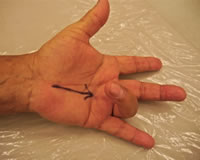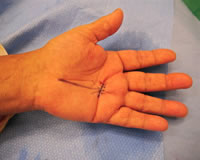Conditions Treated
Trigger Finger
What is it?
Triggering of the thumb and fingers is a common condition that causes painful clicking and locking of the digits when bending the fingers.
What causes it?
Tendons within the hand allow the fingers to bend. They travel from the hand through the fingers via a series of soft tissues "tunnels" called pulleys. These pulleys help improve the efficiently of the tendon in bending the finger. In triggering, the tendon catches inside the pulley as the finger bends causing locking and clicking. The exact cause for this is still unknown but it is more common in females over 40 years old and in patients with other diseases such as rheumatoid arthritis, diabetes and kidney disease.
What are the symptoms?
Most patients complain of painful clicking and locking of the digits with normal, everyday use. Some people make wake to find their fingers locked in a bent position; others may have a painful lump in the palm at the base of the thumb.
Do I need any further investigations?
No. Triggering is a clinical diagnosis and as long as this is your only symptom, no father investigations are required.
What is the treatment?
Around 60-70% of cases of triggering can be cured by a simple injection of steroid around the tendon and pulley; combining this with splinting and avoidance or modification of activities that cause your symptoms maybe all that is needed.
Andy avoids injecting the thumb more than once as repeated injections may cause damage to the tendon.
If after an injection, your symptoms persist or recur then a quick and simple operation to surgically release the pulley from around the tendon would be recommended. This is carried out under local anaesthetic as a day case. Multiple pulleys can be released at one sitting, but only one hand can be operated on at a time.
How long will it take to recover?
Recovery from this operation is very quick. A bulky bandage will be applied to the hand after the operation. You will be seen by a hand therapist at 2 days who will remove this, clean and redress the wounds for you. The hand therapist will get you moving your hand very early after surgery to avoid stiffness.
The stiches are removed at around 10 days and Andy will review you at 2 weeks.
Following your 2 week appointment your hand therapist will get you moving your hand more and more and will also advise how to help soften and desensitize the scars.
What are the potential complications?
Any surgical procedure carries risks, however every effort is made to minimize these to ensure the best possible outcome from your surgery.
- Infection - Uncommon and usually treated very successfully with antibiotics
- Delayed healing - Smokers and those with diabetes are more prone to this
- Painful/Tender Scars - Rigorous wound care and desensitization as directed by your hand therapist help prevent this.
- Stiffness - Operations to the hand may cause stiffness, this can be minimized by working closely with your hand therapist and getting your hand moving as early as possible.
- CRPS - An uncommon but potentially serious complication of hand surgery leading to pain, swelling and discomfort. It is impossible to predict this problem but working closely with you hand therapist and getting your hand moving early has been proven to significantly reduce the risk of this.
- Damage to the digital nerve - Occurs in less than 1% of patients and would require surgical repair. Despite this numbness of the finger may still persist.
When can I get back to normal activities?
The hand MUST be kept clean and dry for 10 days until the sutures are removed. You should be able to return to "desk job" type activities within a few days of the operation. Any manual work, heavy lifting or sporting activities should be avoided for at least 3-4 weeks.
You may return to driving in about a week. Please inform your insurance company that you have recent hand surgery to ensure that are happy for you to do so.


